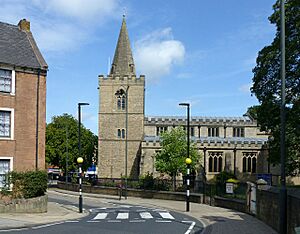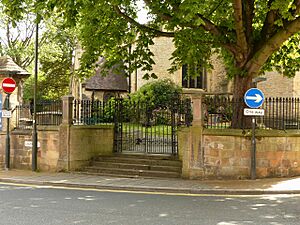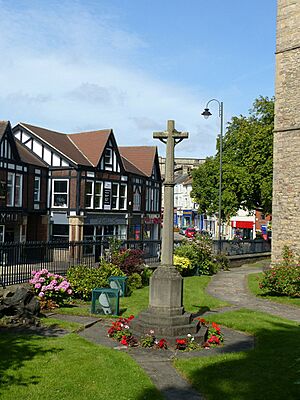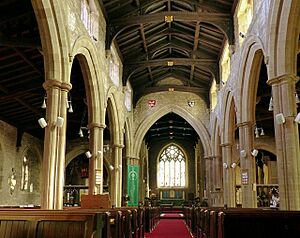St Peter and St Paul's Church, Mansfield facts for kids
Quick facts for kids St. Peter and St. Paul's Church, Mansfield |
|
|---|---|
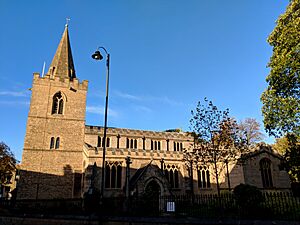 |
|
| Location | Church Side
Mansfield Nottinghamshire NG18 1AP |
| Denomination | Church of England |
| Churchmanship | Broad Church |
| History | |
| Dedication | |
|
Listed Building – Grade I
|
|
| Official name: St. Peter and St. Paul's Church, Mansfield | |
| Designated: | 19 December 1955 |
| Reference #: | 1214166 |
|
Listed Building – Grade II
|
|
| Official name: Boundary wall and gates to the churchyard of St. Peter and St. Paul’s Church | |
| Designated: | 12 May 1993 |
| Reference #: | 1288704 |
| Administration | |
| Parish | Mansfield |
| Diocese | Southwell and Nottingham |
| Province | York |
St. Peter and St. Paul's Church, Mansfield is a historic parish church located right in the centre of Mansfield, Nottinghamshire. It belongs to the Church of England. This church, along with its war memorial and railings, is considered very important for its special architecture.
This church is so old that it was even mentioned in the famous Doomsday book from 1086!
Contents
Discover the Church's Long History
A part of St. Peter and St. Paul's Church dates back to the Norman times. In 1096, King William II gave the church to Robert Bloet, who was the Bishop of Lincoln.
Building and Changes Over Time
In the 12th century, a new stone nave (the main part of the church) and chancel (the area around the altar) were built. As Mansfield's population grew, the church also got bigger. In the 13th century, more parts were added, including a new aisle and two altars.
Sadly, in 1304, a fire almost completely destroyed the church. But don't worry, it was rebuilt and restored by 1420! The church tower was also made taller in the 14th century. In 1428, during the time of King Henry VI, the church was still connected to the Bishop of Lincoln.
In 1521, a businesswoman named Dame Cecilly Flogan gave some land to the church for 99 years. Later, in 1557, Queen Mary I and King Philip issued a special document. This document allowed the church to officially own land. The church's steeple was added in 1583, though some people think it was added later, in 1666. Inside the north aisle, there's a special brass plaque from 1714 that remembers Queen Anne.
George Fox and the Church
George Fox, who started the Quakers religious group, lived in Mansfield in 1647. He stayed near where St Philip Neri Church is today. George wrote in his journal about walking by the "steeplehouse" in Mansfield. He said that God told him that what people "trample upon" would be his "food." He understood this to mean that people were ignoring the true "life of Christ." The "steeplehouse" he was talking about was St. Peter and St. Paul's Church.
In 2013, the church celebrated its 900th birthday! They had proof that the original tower was finished by December 1113.
The Church Bells
The church tower has eight bells. The oldest bells date back to 1603. However, the bells you hear today were cast (made) more recently, in 1948.
The Church Organ
The church has a large organ with three keyboards, called "manuals." It was brought to the church in 1970 from Clare College, Cambridge. A specialist named Noel Mander from London made many changes and additions to it before it was installed in the south chapel in 1971. More work and restoration were done on the organ, and it was officially blessed again at the end of 2000.
Meet the Organists
Many talented people have played the organ at St. Peter and St. Paul's Church over the years. Here are some of them:
- Maria Lister 1795–1801
- Joseph Webster ca. 1829
- Miss Cursham ca. 1869
- William Blakely 1883–1891
- Arthur Howard Bonser 1889–1902
- Miss M Coleman 1904–1911
- Dr George P Allen 1911–1957
- C K Turner 1957–1959
- Malcolm Cousins 1959–1993
- David Sheeran Butterworth 1993–1995
- John Gull 1996
- David Cowlishaw 1997
- John P Rose 1998–2007
- Paul Hayward 2007-8
- John Marriott 2009-
More to Explore
- Grade I listed buildings in Nottinghamshire
- Listed buildings in Mansfield (inner area)
Gallery
 | Roy Wilkins |
 | John Lewis |
 | Linda Carol Brown |


